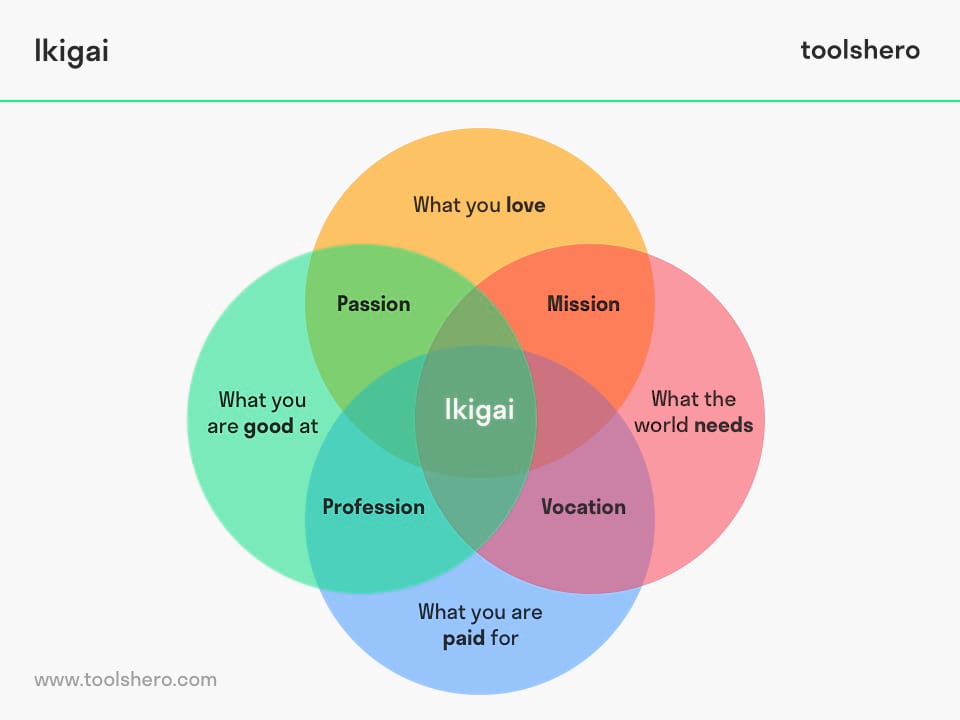Ikigai explained including the meaning

Ikigai: this article will provide a practical explanation of the Japanese concept of Ikigai (pronunciation: ee key guy). This article contains a general explanation of the meaning, a downloadable and editable Ikigai template and the steps involved to find yours. After reading this, you will understand the basics of this Japanese concept for finding your goals in life. Enjoy reading!
What is Ikigai? The meaning explained
There are some places in the world where people live longer, on average, than in the rest of the world. Author Dan Buettner researched these regions and dubbed them the “Blue zones“.
Japan, and the island Okinawa in particular, is such a region. A factor that plays an important role in the health and vitality of the residents of Okinawa is to have ‘a goal’ in their lives: ‘ikigai’.
So in addition to eating habits (including a lot of green tea) and living environment, this Japanese concept plays a major role in ageing healthily and living long and staying happy.
Because your ‘ikigai’ makes it possible to keep looking towards the future, even when you are going through a difficult time.
Dan Buettner talks about this in his inspiring TEDtalk: How to Live to 100+‘. The TEDtalk became popular among people of all ages, also in the younger generations.
Héctor García Puigcerve and Francesc Miralles are considered the original authors of this popular concept, which was introduced in their book ‘Ikigai’. In this book, they also explained what is ikigai and expanded the concept into a useful tool.
What does ikigai mean?
‘Ikigai’ is a concept which originated in the Japanese culture that, simply put, means ‘your reason to get out of bed in the morning’.
In French, it is called ‘raison d’être’. Ikigai is a combination of the words ‘iki‘, meaning life or living, and the word ‘kai‘ (pronounced as gai), which represents value, effect, result or usefulness. This results in ikigai literally meaning the value of your life.
The answer to the question: What does ikigai mean?, can be different for everyone. This is because everyone’s ikigai is different. While the meaning of the word and concept ikigai is always the same, it can take many different shapes. Ikigai meaning the value of living your life, is a very personal concept. The Chart can help you find your reason for living.
Ikigai diagram elements
What is ikigai exactly? It is that place where your passion, mission, calling and career intersect. This is best illustrated by the overlapping circles of a Venn diagram / Chart.
The four circles represent:
- What you love
- What you are good at
- What the world needs
- What you are/could be paid for
The place where the four circles meet, is where you find your ‘ikigai’.

Figure 1 – Ikigai Visual Representation (Chart)
How to find my ikigai?
Go through the questions below, based on the 4 circles from the ikigai diagram, to discover your personal mission.
Step 1: What do you love?
If you have a job;
- Do you enjoy going to work?
- Do you have an emotional attachment to your job? Do you stand behind the company vision?
- If the answer is no; what would you enjoy?
If you have a hobby;
- Are enthusiastic about your hobby or craft?
- Do you have an emotional attachment to your hobby or craft? Do you get more excited about this than anything else?
Step 2: What are you good at?
If you have a job;
- Do people ask you for advice about work?
- What parts of your job do you find easy?
- Are you an expert in your field?
- Would you like to be an expert?
If you have a hobby:
- Are you good at what you do?
- Do you want to become an expert?
- Do others ask for your vision?
Step 3: What does the world need?
If you have a job;
- Is your work in high demand?
- Will your work or position still be valuable in 5 years? And in 10 years? And 100 years from now?
- Does your job solve a particular problem?
If you have a hobby;
- Is your hobby or craft still valuable in the future?
Step 4: Can you be paid?
If you have a job;
- Do others get paid for the work you do?
- Are you earning well now?
- Will you be able to earn well in the future?
- Is there healthy competition in your industry?
If you have a hobby or craft;
- Have others been able to make their hobby their job?
- Have people around you asked if they can buy something from you?
What does the outcome of the above questionnaire say?
If you answered yes to the questions asked in the hobby/craft section: continue what you are doing! You can make sure that your hobby eventually becomes a job that allows you to support yourself.
If you answered no: no worries. Not everyone finds their personal ikigai right away. Continue to discover different things and try as many things as possible when it comes to work or hobby in different sectors. After gaining new experiences, repeat the questionnaire again.
IKIGAI – Find Your Life Purpose
Online IKIGAI course ~ A certified course in personal development, based on the ancient Japanese framework, IKIGAI.
How to apply your ikigai
You can only apply your ‘ikigai’ once you know what it is for you. For many people that requires an extensive search of the self first. But if you want to make a start at understanding your ‘ikigai’, you could start by making your own Venn diagram.
Fill the circles with words, ideas, pictures or sentences that fall under the ‘You like it’, ‘You are good at it’, ‘The world needs it’, and ‘You are paid for it’.
Try to answer questions like: What makes you tick?; What touches you?; What are you good at?; Which unique talents do you have and which can you further develop?; What can you do that is of use to others?; Is there something you can contribute to the world?; What change would you like to bring about in the world?
Search for the (natural) overlap of the various circles. Look at the complete picture and try to find connections. If you are going to do it, take your time. Give ideas and impulses a chance and keep an open mind. That way, your life goals will eventually become clear.
Advantages of having an Ikigai
The advantages of this Japanese concept seem clear. It gives you a reason to get up in the morning. Enjoying in your work, loving what you do, giving meaning to your existence. Combined with healthy eating and a nice living environment, your ‘ikigai’ is an important ingredient for healthy ageing.
Ikigai example
In a rapidly changing world, more and more people are looking for a way to combine their passion and talents in order to contribute to society. That is basically what ‘ikigai’ is.
An appealing example of people who practice theirs every day are David de Kock and Arjan Vergeer from 365 days successful.
They aim to make the Netherlands the happiest country in the world, and they want to achieve that by helping others get the best out of themselves.
As they say on their website: ‘One thing we learned in recent years: If you really want something and you choose a method to get there, everything is possible. Not only in your mind, but especially in reality.’
In summary
‘Ikigai’ is a Japanese concept that is about having (of finding) a goal in life, a reason for getting out of bed in the morning. Your ‘ikigai’ is the point where a number of aspects come together, namely what you love, what you are good at, what the world needs and what you can be paid for. It is where your passion, mission, craft and calling intersect. The basis for finding your ‘ikigai’ is usually an extensive search for yourself.
Ikigai Chart template
Discover your own Ikigai by following the step-by-step plan in this Ikigai Chart template. Available as an editable template.
Download the Ikigai template
This template is exclusively for our paying Toolshero members. Click here to see if a membership is something for you!Now it’s your turn
What do you think? Have you already found your ‘Ikigai’? Or are you still searching? Has this article given you an idea on how to get started?
Share your experience and knowledge in the comments box below.
More information
- García, H., Miralles, F. (2017). Ikigai: The Japanese Secret to a Long and Happy Life. Penguin Books.
- Mathews, G. (1996). What makes life worth living?: How Japanese and Americans make sense of their worlds. Univ of California Press.
- Nakanishi, N. O. R. I. Y. U. K. I. (1999). ‘Ikigai’in older Japanese people. Age and ageing, 28(3), 323-324.
- Sone, T., Nakaya, N., Ohmori, K., Shimazu, T., Higashiguchi, M., Kakizaki, M. & Tsuji, I. (2008). Sense of life worth living (ikigai) and mortality in Japan: Ohsaki Study. Psychosomatic Medicine, 70(6), 709-715.
How to cite this article:
Kuijk, A. (2017). Ikigai. Retrieved [insert date] from Toolshero: https://www.toolshero.com/psychology/ikigai/
Original publication date: 09/05/2017 | Last update: 12/17/2023
Add a link to this page on your website:
<a href=”https://www.toolshero.com/psychology/ikigai/”> Toolshero: Ikigai</a>












